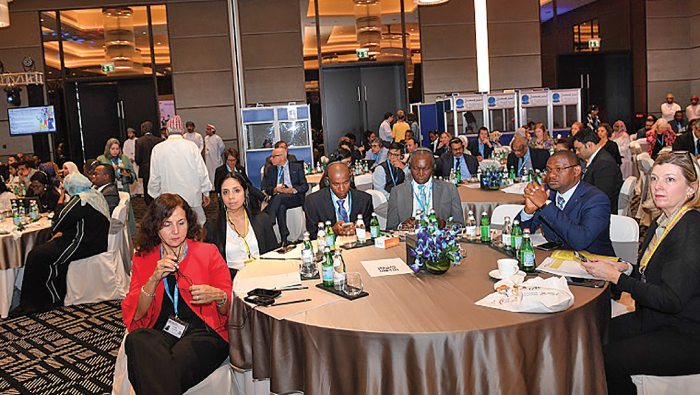
Muscat: Oman welcomed about 600 delegates from around the world, including ministers and high-level delegates at the World Health Organisation’s Global Meeting on Non-Communicable Diseases (NCDs) and Mental Health, being held between December 9 and 12, 2019.
The representatives from over 100 member states of the World Health Organisation (WHO) across the globe came from public health and other sectors, UN agencies, civil society, private sector, philanthropies, and academia. The delegates gathered around the aim to reduce early deaths and scale up interventions to reach UN Sustainable Development Goals (SDGs) Target 3.4 by the year 2030 by catalysing action through partnerships and capacity building.
The first event of the Global Meeting included a Technical Meeting of the National NCD Directors and Programme Managers that aimed at strengthening their capacity in order to implement a set of priority interventions that will put their countries on a sustainable path to attain SDG target 3.4 on NCDs and mental health by 2030, fulfil the commitments made by Heads of State and Government in the Political Declarations of the UN General Assembly adopted in 2011, 2014 and 2018, in addition to contributing to the “triple billion” targets for WHO’s NCD-related actions set out in the 13th Global Programme of Work.
Distinguished delegates
On the opening of the Technical Meeting, Dr Ali bin Talib Al Hinai, MOH’s Undersecretary for Planning Affairs welcomed the honourable ministers of health and the distinguished delegates to the meeting, which is a timely opportunity to review the progress related to one of the core SDG 2030 targets; wishing them all productive meeting. Dr Al Hinai confirmed that saving lives from premature deaths due to NCDs is an achievable target. A multi-sectoral approach proven effective, as the government of Oman has demonstrated. It includes cross-sectoral government leadership, cooperating alongside civil society partners, and the private sector to implement evidence-based interventions to reduce known risk factors, prevent NCDs from developing in the first place and provide effective treatment for affected populations.”
Meanwhile, Dr Ahmed Al Mandhari, Regional Director, WHO- EMRO, emphasised that people living with NCDs and mental disorders are often uninsured, paying out of pocket for the care they need, and have inadequate access to health and care services. These conditions do not just harm individuals, they can also damage international development and security.
So, by strengthening health systems, we can help protect individuals and promote community resilience while also contributing to national development and international peace, he added.
Dr Al Mandhari outlined that the next four days offer a precious opportunity to learn, share experiences and develop collaborative partnerships. Together, he added, they can accelerate action towards achieving health and well-being for all, including target 3.4: to reduce premature mortality due to NCDs by one-third by 2030 and promote mental health and well-being, as well as target 3.8: to achieve universal health coverage for all.
On addressing NCDs, Dr Akjemal Magtymova, WHO Representative in the Sultanate, emphasised that “PHC for UHC” is the key to tackling NCDs, because prevention is as vital as cure. Oman, with its well-developed Primary Health Care network provides integrated quality and affordable care near people’s homes. The government adopts population-based policies to ensure healthier environments to reduce NCD risk factors, such as smoking, sugar intake or limiting salt and saturated fat intake.”
“Furthermore, there is a momentum with more cities and settings in Oman committing to healthy cities initiatives and multi-sectoral approach to health – this is a recipe to success,”
he added.
Dr Svetlana Akselord, WHO Global NCD Platforms Director commenced the opening session on celebrating the powerful contribution that SDG 3.4 can make to socio-economic development in countries by 2030. She gave a brief overview on the Global Meeting’s purpose, objectives, and sessions. The purpose of the Global Meeting, as Dr. Akselord stated is to ensure that the NCD and mental health Directors and Managers of the Member States have the necessary tools and knowledge to implement all the high-level commitments articulated in Political Declarations in order to reach SDG target 3.4 by 2030.
WHO and the NCD Alliance will launch a collaboration to support national responses by advocating for NCD interventions and policies and supporting countries to track progress towards SDG target 3.4. Currently, only 40 countries will reach SDG Target 3.4. Another 50 countries can achieve targets, if national NCD responses are intensified by 2022.
Every year, globally 15 million people between ages 30-70 die prematurely from NCDs, primarily cardiovascular and lung diseases, cancers and diabetes. Despite the many proven interventions and commitments to combat NCDs, progress has been slow and uneven. The WHO-endorsed low-cost solutions could save millions of lives and create economic growth. These solutions range from marketing bans and taxation to reduce exposure to tobacco and unhealthy foods and drinks, to providing access to essential health services to all people to protect them from these conditions.
Oman was selected to host this global event for its successful collaboration with WHO on addressing NCD milestones, providing a showcase to empower diverse global health stakeholders and thereby accelerate the implementation of national responses to NCDs and mental health conditions.